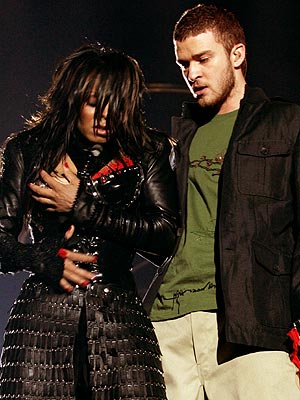
The U.S. Supreme Court ordered a lower court on Monday to reconsider a ruling that struck down a $550,000 fine against CBS Corp television stations for airing a glimpse of pop singer Janet Jackson's breast during the 2004 Super Bowl.
The order sends the case back to a federal appeals court in Philadelphia for further review in light of the Supreme Court's ruling that upheld a U.S. government policy that subjects broadcasters to fines for airing a single expletive blurted out on a live television show.
The appeals court ruled in favor of CBS, saying that the Federal Communications Commission acted "arbitrarily and capriciously" in issuing the fine for a fleeting image of nudity.
Jackson's right breast was exposed to almost 90 million TV viewers for a fraction of a second during the live 2004 Super Bowl football halftime show in what fellow pop singer Justin Timberlake later called a "wardrobe malfunction."
Timberlake ripped off part of Jackson's bustier exposing Jackson's breast during the show. Despite the brevity, lawmakers and regulators were outraged and vowed a crackdown on broadcast indecency.
CBS and cable music network MTV, which produced the Super Bowl halftime show, insisted they did not know in advance about the wardrobe stunt. CBS apologized and paid the fine, $27,500 for each of its 20 owned-and-operated stations, and later instituted a five-second delay on most of its live events.
The appeals court said CBS could not be held liable for the acts of Jackson and Timberlake. That ruling will be reviewed in view of the Supreme Court's order in the case.
The U.S. government appealed to the Supreme Court, urging it either to hear its appeal in the CBS case or to order further lower-court consideration in view of the high court ruling last week in a separate case on the FCC's crackdown on dirty words aired on television.
CBS said the Supreme Court's procedural decision was expected in view of last week's ruling, despite differences in the two cases.
"We are confident that in reviewing the case" the appeals court "will again recognize that the Super Bowl incident, while inappropriate and regrettable, was not and could not have been anticipated by CBS," it said in a statement.
"This remains an important issue for the entire broadcasting industry because it recognizes that there are rare instances, particularly during live programing, when despite best efforts it may not be possible to block unfortunate fleeting material," CBS said.
http://www.reuters.com/article/entertainmentNews/idUSTRE5433DE20090504
No comments:
Post a Comment